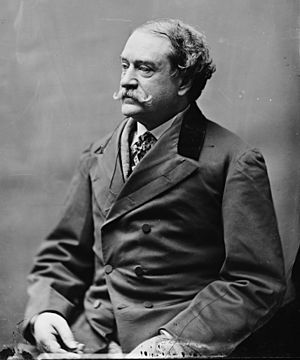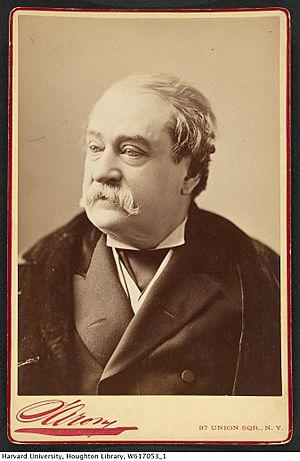John Brougham facts for kids
Quick facts for kids
John Brougham
|
|
|---|---|
 |
|
| Born | 9 May 1814, 1810 |
| Died | 7 June 1880, 1880 |
| Occupation | Writer, playwright, poet |
| Signature | |
John Brougham (born May 9, 1814 – died June 7, 1880) was a talented person from Ireland and America. He was an actor, a writer of plays (a dramatist), a poet, and even managed theatres. As an actor, he was famous for playing funny Irish characters on stage.
He wrote more than 75 plays, and some sources say he wrote over 150! He was especially good at writing plays that made fun of things, like burlesque and satire. Because he wrote so many clever, funny plays, critics called him "The American Aristophanes". Besides his plays, he also published two books of his other writings, including essays and poems.
Brougham started his acting career in London in 1830. He put on his first play there in 1831. For ten years, he performed with the theatre group of actress Lucia Elizabeth Vestris. He later became the manager of the Lyceum Theatre, London in 1840. In 1842, he moved to the United States and made his first American stage appearance in New York City.
In America, Brougham quickly became a popular actor. He toured the country and performed often on Broadway. He also managed several theatres in New York City. He became an American citizen in 1844. He returned to England in 1860, just before the American Civil War. After performing in England and Ireland, he came back to New York City in 1865. He continued acting until 1879 and passed away in 1880.
Contents
Early Life and Education
John Brougham was born in Dublin, Ireland, on May 9, 1814. He was the oldest of three children, but he was the only one who lived to be an adult. His father, who enjoyed painting, died when John was young. His mother faced difficult times, and John was raised in his uncle's home.
Brougham went to a school in Trim, County Meath, to get ready for college. After that, he attended Trinity College Dublin. There, he studied classical subjects and became very interested in student plays. He met people who would help him later in his acting and writing career. He became friends with actress Lucia Elizabeth Vestris and joined a group of friends who put on their own plays. Even though he focused on his studies, Brougham loved acting. He also often went to see shows at the Theatre Royal, Dublin.
John Brougham was originally meant to become a surgeon. He studied at Peter Street Hospital for a short time. However, his uncle could no longer support him financially. So, Brougham had to support himself. He moved to London in 1830 to start a new life.
Theatre Career in London
When John Brougham first moved to London, he faced some tough times. But he had a lucky meeting with Lucia Elizabeth Vestris, whom he had met at Trinity College. Vestris was an actress at the Queen's Theatre. She helped Brougham get a job in a play called Tom and Jerry. In July 1830, he made his first professional stage appearance in London, playing six different characters in that show.
In 1831, Brougham joined Vestris's theatre company, which performed at London's Olympic Theatre. Her husband, Charles Mathews, managed the company. Brougham wrote his first play, a burlesque, for Vestris to star in during 1832. He stayed with her company for ten years. They later moved to the Theatre Royal, Covent Garden (now the Royal Opera House).
Brougham also helped write the play London Assurance in 1841 with Dion Boucicault. He was known for his role as Dazzle in this play. However, he later left the production. In 1840, Brougham became the manager of the Lyceum Theatre, London. He wrote several light, funny plays for this theatre.
Moving to America
In 1842, John Brougham decided to move to the United States. He made his first American appearance in a play called His Last Legs at the Park Theatre in New York City. He joined WE Burton's theatre company and wrote several comedies for them. These included Met-a-mora; or, the Last of the Pollywogs, which was a funny version of another popular play. He also wrote Irish Yankee; or, The Birthday of Freedom.
Later, Brougham managed Niblo's Garden. In 1850, he opened his own theatre, Brougham's Lyceum. He also managed the Bowery Theatre. While plays like Po-ca-hon-tas; or, The Gentle Savage were popular, these theatre ventures were not always financially successful for him. He later worked with Wallack's and Daly's theatres, writing plays for them.
In 1852, he edited a funny newspaper called The Lantern. He also published two collections of his writings: A Basket of Chips and The Bunsby Papers. In 1857, he published A Day in New York.
Return to London and Later Years
In 1860, John Brougham went back to London. There, he wrote or changed several plays, including The Duke's Motto. In November 1864, he performed in his hometown of Dublin at the Theatre Royal, Dublin. He was in the first performance of Dion Boucicault's play Arrah-na-Pogue.
After the American Civil War, Brougham returned to New York City. He opened Brougham's Theatre in 1869 with his comedies Better Late than Never and Much Ado About a Merchant of Venice. However, this theatre management also faced challenges. His last performance on stage was in 1879, playing "O'Reilly, the detective" in Boucicault's play Rescued. He passed away in New York City in 1880.
Brougham was a founding member of the Lotos Club in New York, which started in 1870. He was also its first vice president and, for a time, its president.
Personal Life
John Brougham was married twice. His first wife was Emma Williams, whom he married in 1838. She passed away in 1865. In 1844, he married Annette Hawley, who was also an actress. She passed away in 1870. Both of his wives were actresses.
Notable Plays and Writings
Sources have different numbers for how many plays John Brougham wrote. The Oxford Dictionary of National Biography says he wrote more than 75 plays, while the Historical Dictionary of American Theater says he wrote over 150. Brougham was especially good at writing funny plays that made fun of society. Because he wrote so many clever, satirical plays, critics called him "The American Aristophanes".
The New York Tribune newspaper, in his obituary in 1880, listed some of his most famous plays. These included Life in the Clouds, Love's Livery, The Irish Yankee, David Copperfield (a play based on the book), Bleak House (another adaptation), Pocahantas, This House to Be Sold, and Much Ado About a Merchant of Venice. Other works he wrote include The Lottery of Life (1867) and Home Rule, which was his last play.


